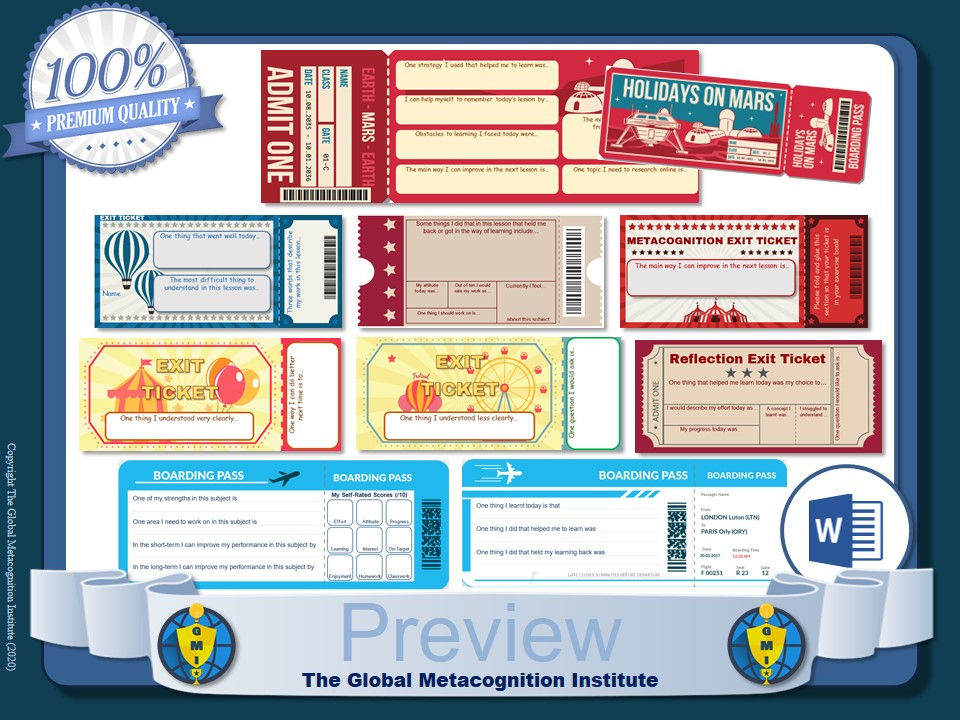Metacognition is the awareness and understanding of thought itself and, more generally, the learning-processes one is engaged in; for a student to engage in metacognition is for them to plan, monitor, evaluate and/or regulate their own thinking with a view to enhancing learning or problem-solving. Recently, the definition of metacognition has been broadened and includes not only ‘thoughts about thoughts’ as it was previously considered, but the following notions as well: knowledge of one’s knowledge, processes, and cognitive and affective states; and the ability to consciously and deliberately monitor and regulate one’s knowledge, processes, and cognitive and affective states (Louca, 2003). Kluwe (1982) brought further definition to the concept of metacognition, describing activities referred to as metacognitive:
‘(a) the thinking subject has some knowledge about his own thinking and that of other persons; and
(b) the thinking subject may monitor and regulate the course of his own thinking, i.e. may act as the causal agent of his own thinking’.
Metacognition, especially the ability for students to evaluate their own level of understanding, is an essential component of self-regulated learning. The absence of metacognition connects to the research by Dunning, Johnson, Ehrlinger, and Kruger on “Why People Fail to Recognize Their Own Incompetence” (2003). They found that “people tend to be blissfully unaware of their incompetence,” lacking “insight about deficiencies in their intellectual and social skills.”
This article explores long-term metacognitive strategies that teachers can employ to foster regular metacognitive reflection.
Long-Term Strategies for Enhancing Metacognition & Self-Regulation
Metacognition and self-regulated learning are critical skills for academic and lifelong success. Teachers and educators can take a proactive approach to boost these skills in their students through long-term strategies that promote self-awareness, reflection, and goal-setting. In this article, we will explore some of the long-term strategies teachers and educators can use to boost metacognition and self-regulated learning with their students.
Teach metacognitive strategies explicitly Metacognitive strategies are techniques that help students to think about their thinking. These techniques include setting goals, planning, monitoring progress, and reflecting on learning. Explicitly teaching metacognitive strategies can help students to become more aware of their own learning processes and to take responsibility for their own learning. Teachers can incorporate these strategies into their lesson plans and model them for students.
Use formative assessment Formative assessment involves providing feedback to students throughout the learning process. This feedback can help students to identify their strengths and weaknesses, set goals, and monitor progress. Teachers can use a variety of formative assessment techniques, such as self-assessment, peer assessment, and teacher feedback, to help students develop metacognitive skills.
Encourage reflection Reflection is a crucial part of metacognition and self-regulated learning. Teachers can encourage reflection by providing opportunities for students to think about their learning. This can be done through activities such as journaling, group discussions, and reflective writing. Teachers can also model reflection by sharing their own thought processes with students.
Encourage goal-setting Goal-setting is an essential part of self-regulated learning. Encourage students to set both short-term and long-term goals, and teach them how to break down their goals into achievable steps. Teachers can provide guidance and support in goal-setting, and help students to reflect on their progress towards their goals.
Foster a growth mindset A growth mindset is the belief that abilities can be developed through hard work and dedication. Teachers can foster a growth mindset in their students by emphasizing the importance of effort and persistence. Encourage students to embrace challenges, learn from mistakes, and view setbacks as opportunities for growth.
Use differentiated instruction Differentiated instruction involves tailoring instruction to meet the needs of individual students. By using differentiated instruction, teachers can help students to develop metacognitive and self-regulated learning skills at their own pace. This can involve providing different levels of support, offering choices in assignments, and adapting instruction to match students’ interests and learning styles.
Metacognition and self-regulated learning are critical skills for academic and lifelong success. By using long-term strategies such as teaching metacognitive strategies explicitly, using formative assessment, encouraging reflection, goal-setting, fostering a growth mindset, and using differentiated instruction, teachers and educators can help their students to develop these skills. These strategies require time and effort but can have a significant impact on student achievement and success.
We have created a suite of over forty metacognition and self-regulated instructional materials that can help you implement long-term metacognitive development: have a look here!
References
Dunning D, Johnson K, Ehrlinger J, Kruger J. Why people fail to recognize their own competence. Current Directions in Psychological Science. 2003;12:83–87.
Louca, Eleonora. (2003). The concept and instruction of metacognition. Teacher Development.
Kluwe, R.H. (1982) Cognitive Knowledge and Executive Control: metacognition, in D.R. Griffin (Ed.) Animal Mind-Human Mind, pp. 201-224. New York: Springer-Verlag.
















































Yorumlar